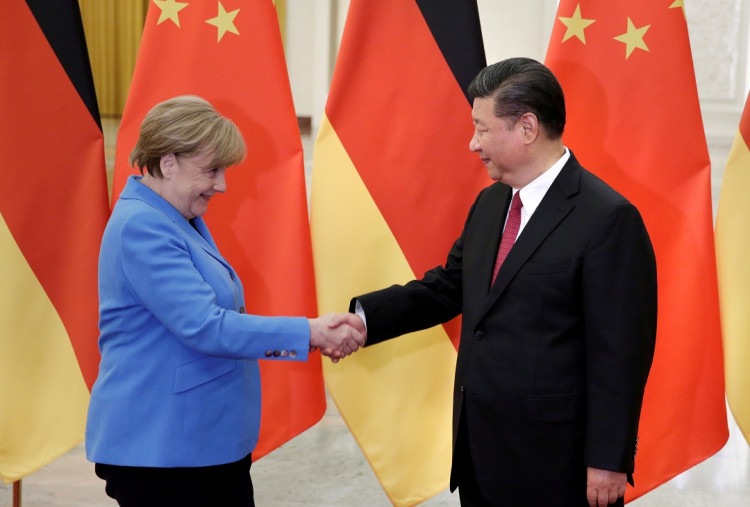Germany will harden its position against China for anticompetitive practices and alleged human rights violations.
Pressure is mounting within the ruling Christian Democratic Union (CDU) headed by Chancellor Angela Merkel to abandon the federal government's decadeslong policy of "change through trade."
Germany has until now favored trade with China compared with engaging it on business and human rights abuses.
Germany, like all other western states, has maintained commercial relations with countries with poor human rights records like China, Economic Affairs Minister Peter Altmaier said last year.
China remains Germany's most important export market and Altmaier said nothing useful could be achieved by introducing sanctions or boycotts. In 2019, Germany exported $121 billion to Germany, more than it did to the U.S.
But the continuing oppression of the Muslim Uyghur ethnic group has led the Merkel government to conclude there will be no "political change" in China through trade.
Merkel has also soured on China. In October, Merkel said China must do more to make it easier for European companies to do business there if it expects the same treatment.
Merkel said there are still far too many hurdles for European companies to overcome when doing business in China. She urged China to compete on a level playing field.
German companies have echoed Merkel's complaints. They said they want better market access in China and more legal certainty for their investments.
Dr. Daniela Schwarzer, who manages the European program at the German Marshall Fund in Berlin, said the main problem with China was there wasn't a level playing field for foreign companies. Then as now, China keeps its market tightly regulated, if not closed, for outsiders.
"That's a huge challenge for the new German government," said Schwarzer. "The German government needs to raise awareness of the threat posed by the competitor China."
"There is a great deal of pressure to be stricter with China," according to Noah Barkin, managing editor at New York City-based research company Rhodium Group.
"Under Merkel, Germany did not really have red lines. That needs to change. Europe needs to develop stricter boundaries with China."
The new government that will likely succeed Merkel in September will be headed by Armin Laschet, who was elected leader of the CDU two weeks ago. Laschet, the current Minister-president of the state of North Rhine-Westphalia, is a longtime supporter of Merkel.
Laschet says he stands for "a level-headed approach and avoiding extremes." His politics "turns toward people and does not turn its back on them."
But "Laschet is seen as a loyal supporter of Merkel and he is supported by Merkel in turn" said Shi Zhiqin, director of the China-EU relations program at the Carnegie-Tsinghua Center in Beijing.
"So, if he becomes the German chancellor, he will largely continue the Merkel era's domestic and foreign policies."
Shi said even if the new German government under Laschet and the Biden administration "are keen to repair the transatlantic alliance, a joint effort by the U.S. and Europe Union to isolate and sanction China is unlikely because of China's good cooperation with Germany and with Europe."






